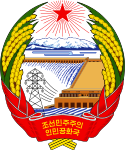List of political parties in North Korea
 |
|---|
|
|
Political parties in North Korea are heavily tied to the function of the government. North Korea has several parties, but the Workers' Party of Korea (WPK) has a stranglehold on political power.
As of the latest election in 2014, three parties (WPK, Korean Social Democratic Party, and Chondoist Chongu Party) and one organization (Chongryon) are represented in the Supreme People's Assembly, the country's parliament.
List
| Party | SPA seats | Status | Ref | |
|---|---|---|---|---|
| style="background:Template:Workers' Party of Korea/meta/color"| | Workers' Party of Korea (Template:Workers' Party of Korea/meta/abbr) 조선로동당 Chosŏn Rodongdang |
607 / 687
|
Ruling party | [1][2] |
| style="background:Template:Korean Social Democratic Party/meta/color"| | Korean Social Democratic Party (Template:Korean Social Democratic Party/meta/abbr) 조선사회민주당 Chosŏn Sahoe Minjudang |
49 / 687
|
Minor party, subordinate to the WPK | [1][2] |
| style="background:Template:Chondoist Chongu Party/meta/color"| | Chondoist Chongu Party (Template:Chondoist Chongu Party/meta/abbr) 천도교청우당 Ch'ŏndogyo Ch'ŏngudang |
22 / 687
|
Minor party, subordinate to the WPK | [1][2] |
| Chongryon (CYJ) 재일본 조선인 총련합회 Chaeilbon Chosŏnin Ch'ongryŏnhaphoe |
6 / 687
|
Not a party, but appoints deputies to the SPA | [1][2] | |
| Korea Buddhist Federation (KBF) 조선불교도련맹 Chosŏn-bulgyodo-ryŏnmaeng |
— | Pseudo-party, last time won a seat with certainty in 1972 | [3] | |
| style="background:Template:Democratic Independent Party/meta/color"| | Democratic Independent Party (Template:Democratic Independent Party/meta/abbr) 민주독립당 Minju Tongnipdang |
— | Participated in elections between 1948 and 1967, last time won a seat with certainty in 1962 | [1] |
| Dongro People's Party (DPP) 동로인민당 Dongro Inmindang |
— | Participated in elections between 1948 and 1967, last time won a seat with certainty in 1962 | [1] | |
| Gonmin People's Alliance (GMH) 건민인민연합 Gonmin Inminyŏnhap |
— | Participated in elections between 1957 and 1967, last time won a seat with certainty in 1962 | [3] | |
| People's Republic Party (IRP) 인민공화당 Inmin Konghwadang |
— | South Korea-based party, participated in elections between 1948 and 1967, last time won a seat with certainty in 1957 | [1][4] | |
| style="background:Template:Laboring People's Party/meta/color"| | Laboring People's Party (Template:Laboring People's Party/meta/abbr) 근로인민당 Kŭllo Inmindang |
— | South Korea-based party, last time won a seat with certainty in 1957 | [4] |
| Union of People's Masses (UPM) |
— | South Korea-based party, last time won a seat with certainty in 1957 | [4] | |
North Korean opposition parties
There is currently no known organized opposition within North Korea that is independently verifiable. However, there are various exiled dissident groups that oppose the regime.
See also
- Democratic Front for the Reunification of the Fatherland
- Elections in North Korea
- Politics of North Korea
- List of ruling political parties by country
References
- ^ a b c d e f g Suh 2001, p. 404.
- ^ a b c d "IPU PARLINE Database: Democratic People's Republic of Korea, Choe Go In Min Hoe Ui". Inter-Parliamentary Union. Retrieved 19 October 2018.
- ^ a b Suh 2001, pp. 404–405.
- ^ a b c Tertitskiy, Fyodor (19 September 2017). "1959: Secret elections in North Korea". DailyNK. Retrieved 30 November 2017.
Works cited
- Suh, Mark B. (2001). "Korea (Democratic People's Republic / North Korea)". In Nohlen, Dieter; Grotz, Florian; Hartmann, Christof (eds.). Elections in Asia and the Pacific: A Data Handbook. Vol. 2. pp. 395–409. ISBN 0-19-924959-8.
{{cite book}}: Invalid|ref=harv(help)
Further reading
- Lankov, Andrei N. (2001). "The Demise of Non-Communist Parties in North Korea (1945–1960)". Journal of Cold War Studies. 3 (1): 103–125. doi:10.1162/15203970151032164. ISSN 1520-3972.
- Tertitskiy, Fyodor (26 November 2014). "Being a minor party in the North: In a totalitarian regime, what do N. Korea's other political blocs do?". NK News.
